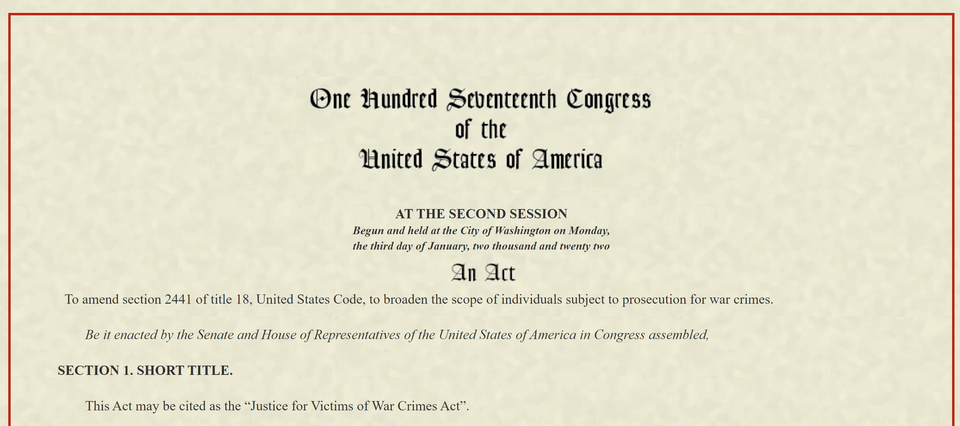
U.S. Expands Potential for War Crimes Cases
On January 5, 2023, President Biden signed into law the Justice for Victims of War Crimes Act which expands the ability of prosecutors to charge war criminals in the United States. It allows the prosecution of those present in the U.S. even if neither the perpetrator or victim is a U.S. citizen or member of the U.S. armed forces. It also removes the statute of limitations which previously prevented prosecution of crimes that were committed more than five years prior. The new law is a positive step, but there remain important legal and practical limitations to any war crimes case moving forward in the U.S., particularly for crimes committed in Syria.
The new law fulfills a promise the U.S. made by signing and ratifying the Geneva Conventions of 1949 which requires the prosecution of any person suspected of committing grave breaches (i.e. serious war crimes). Spurred notably by the desire to hold accountable perpetrators of war crimes in Ukraine, the new law prevents the U.S. from becoming a safe haven for human rights violators and gives prosecutors another tool for prosecuting atrocity crimes.
There are however some important caveats. The law adds a new requirement that any war crimes prosecution be approved by an official within the Department of Justice. For crimes where the perpetrator or victim is a U.S. citizen or member of the U.S. armed forces, the certifying official must be the Attorney General, his or her Deputy, or an Assistant Attorney General. For perpetrators merely present in the U.S., it must be the AG or his or her Deputy. To make this determination, the certifying official must consider the potential adverse consequences to U.S. citizens, servicemembers or U.S. government employees and whether another venue is available for prosecution. This certification requirement cannot be delegated. Although some states, such as Sweden, have a similar requirement, this adds a political element to determining whether to pursue war crimes as it removes from everyday prosecutors the decision as to whether to pursue a case. Unlike other criminal cases, the merits of a war crimes case will not be determined solely upon the available evidence and substantive law.
In addition, the law is not retroactive, meaning war crimes committed prior to the signing of the law in 2023 cannot be prosecuted under the statute. To be clear, any crimes committed in Syria from 2011-2023, where the victim and perpetrator are not U.S. citizens or members of the U.S. armed forces, cannot be prosecuted under the new law. The practical importance of the law is further limited by the fact that few Syrians have travelled to the U.S. due to geographic distances and visa restrictions.
Head of State and functional immunities also present a barrier to the future prosecution of war criminals in the U.S. (as well as other states). Foreign presidents and diplomats cannot be arrested while attending the UN General Assembly, for example, as they are protected from criminal prosecution. Still, Heads of State may be prosecuted for war crimes when they are no longer in office and there is growing precedent to suggest that all grave breaches are outside the scope of functional immunity. (Furthermore, head of state immunity has no application in international tribunals.)
Another major obstacle to cases moving forward is the reluctance of U.S officials to bring such cases. To date, the U.S. has not prosecuted a case for war crimes, genocide or the recruitment of child soldiers, despite these statutes being available. It has instead relied upon immigration violations as a stand-in to prosecute war criminals for lying about their past conduct.
All of that said, the amendments to the War Crimes Act provides some new hope to survivors of war crimes. It is an important symbolic acknowledgement of the importance of prosecuting atrocity crimes and the U.S.’s obligations to prosecute such crimes. It may also allow the U.S. to file indictments against human rights violators who are not present in the U.S. for the eventuality that they come into U.S. custody. In sum, the success of the law will only be clear if and when U.S. authorities invoke the new law and are successful in holding perpetrators of war crimes accountable.
________________________
For more information or to provide feedback, please contact SJAC at [email protected] and follow us on Facebook and Twitter. Subscribe to SJAC’s newsletter for updates on our work